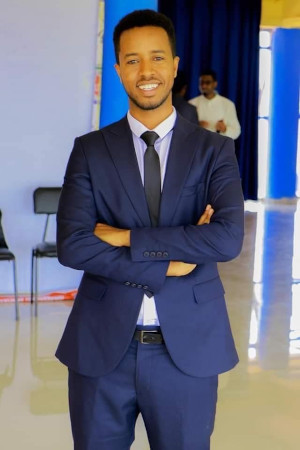
Abdirahman Ahmed is currently an Assistant Professor of Sociology and Director of the Institute of Migration Studies at Jigjiga University, Ethiopia. His research interest is on the durable solutions for forcibly displaced (refugees and IDPs) and diaspora engagement in Ethiopia.
Current affiliation
- Institute of Migration Studies, Jigjiga University; Ruhr University Bochum
Hosting institute
Contact
- Email: …
Key expertise
- forced migration, refugees, IDPs
- migration policy
- migration and development
- diaspora studies
- climate change
- GS GN research collaboration and knowledge production
Regional expertise
- Äthiopien
- Somalia
Profile according to FFVT taxonomy
Fields of research
- Development Research
- Migration Research
Scientific topics
- Causes Of Displacement
- Economy Of Forced Migration
- Environment And Climate
- Infrastructure Of Flight / Forced Migration
- Integration And Social Participation
- Local And Municipal Refugee Policies
- Migration Routes, Refugees’ Journeys
- National Refugee And Asylum Policies
- Refugee Camp
- Refugee Law
- Self-Organization
Disciplines
- Anthropology
- Sociology
Relevant publications
- A. A. Muhumad, J. Grävingholt, M. Flaig . Displacement cases: Ethiopia. In Jochen Oltmer, Marcel Berlinghoff, Franck Düvell, Ulrike Krause, Andreas Pott (Eds.), Report Global Flight 2023. 2023. Fischer.
- A. A. Muhumad, R. Jaji. Somali Refugees, Informality, and Self-initiative at Local Integration in Ethiopia and Kenya. In Journal on Migration and Human Security, 11(1), 75–88. 2023. SAGE.
- A. A. Muhumad, M. Fadal, M. Hussein, P. Iyer, L. Brain. Bridging the gap: environmental change, mobility and policy in Ethiopia’s Somali Region and Somaliland. 2022. London: EU Trust Fund for Africa (Horn of Africa Window) Research and Evidence Facility.
- I. Bangura, A. Chakraborty, A. Garcia-Hernandex, L. Kaplan , J. Kuhnt, A. A. Muhumad, J. Steinert, D. Tellez. Ethical failures in global research: violations of Sustainable Development Goal 8, ‘decent work for all’. In The Lancet Global Health, 10(5). 2022. Elsevier BV.
- A. A. Muhumed, E. Stites, E. Alexion , D. Bruns . Livelihood Components of Durable Solutions for IDPs: Assessment of three cases in Somali Region, Ethiopia. 2021. Boston, MA: Feinstein International Center, Tufts University.
Research profile
Q1. Who are you?
My name is Abdirahman Ahmed. I have a post-graduate degree in Social Structure and Social Change from Istanbul University, Turkey. Currently, I am an Assistant Professor of Sociology and Director of the Institute of Migration Studies at Jigjiga University, Ethiopia. My research interest is on the durable solutions for forcibly displaced (refugees and IDPs) and diaspora engagement in Ethiopia.
Q2. What was your motivation for applying for the FFVT fellowship? Why Germany?
Ethiopia hosts the third-largest number of refugees in Africa, with a long history of hosting refugees. The country is also one of the top countries that host the largest numbers of IDPs globally. Having worked with academic, humanitarian, and development organisations in Ethiopia, my research interests focussed more on durable solutions for forcibly displaced people in Ethiopia with the aim to contribute to the national efforts to find lasting solutions for the forcibly displaced through research and policy recommendations. In this capacity, I had the opportunity to partner with the German Development Institute (GDI/DIE) and co-authored a discussion paper on the local integration of refugees in Ethiopia. As one of its main objectives, the FFVT fellowship offers the opportunity to strengthen networking opportunities with institutions working on forced migration-related issues. I was motivated by the possibility to link up with these institutions and establish networking for future collaborations on the topic. FFVT also offers the opportunity to advance my career and capacity to conduct research on forced migration and durable solutions with renowned experts and institutions in the field. I was motivated by all the possibilities and potentials that the fellowship offers.
Q3. What do you expect from the fellowship?
I look forward to building my research expertise, sharing my knowledge and connecting experts in forced migration studies for future research collaborations. With these networks and potential collaborations, I expect to link the research institutions working on migration research in my country with those in Germany for better global south–global north migration research partnerships.
Q4. What is the focus of your work, and what is innovative about it? / What are your planned outcomes and activities for the fellowship period? And how do they relate to your FFVT hosting institution/ the FFVT cooperation project?
During my stay, I plan to produce two scientific works on the local integration of refugees and on global south–global north research partnerships with other colleagues. Moreover, I am also working (with other FFVT colleagues) on a virtual discussion on the situation of forced migration and durable solutions in Ethiopia to shed light on the current status of forced displacements and durable solutions and suggest policy recommendations on the situation.
These activities are related to the overall objectives of FFVT, including, but not limited to, strengthening networking on forced migration research by linking migration research institutions in the global south and global north.